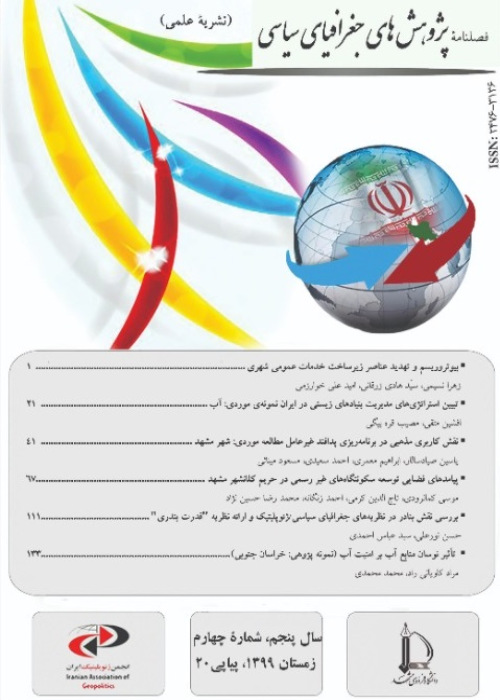Investigating the Effect of Tribal Culture on Electoral Behavior of Villagers in Dena County
Dena County in Kohgiluyeh and Boyer Ahmad province is one of the areas in Iran with more than 83% of its population with tribal culture living in villages. The dominance of this culture has led to a certain type of electoral behavior in this county. Although the electoral behavior can be judged as the highest political participation, it can hardly be considered as a symbol of political development. What is the impact of tribal culture and tribal elites on the electoral behavior of the villagers in Dena County is the main question of the present research. In order to answer this question, the impact of tribal culture on people's electoral behavior must be examined. The same question can be formulated in two research hypotheses: "there is a meaningful relationship between tribal culture and villagers' electoral behavior" and ''there is a meaningful relationship between the political viewpoints of the tribal elites and the electoral behavior of the villagers".
In reviewing the research literature, two categories of research projects can be mentioned. The first is the books and articles dealing with the geography of elections, and the second is the works that have attempted to analyze the relationship between tribalism and elections in Iran. The first and most prominent work in the first category is the book of “Geography of Election” by Johnston and Taylor (1979). Johnson, in another work with Pattie (2006), tried to show how geographical boundaries as an electoral context could affect the composition and political functions of government in Britain. In Iranian works, Kaviani Rad has attempted to study the impact of geography on Iran's elections. He has authored two books entitled Geography of Elections: Emphasizing on the Presidential Elections (2013) and Geography of Elections: Foundations, Approaches, and Concepts (2018). He has also published articles in this field (2007, 2009). The second group of works related to tribalism - which are closer to the subject of the present study - are the works of Yeganeh and Hasanvand (2013), Pooran Asl (2013), Safari (2010) and Rameshk (2003).
The present research employes an analytical and survey method. The statistical community of this research consisted of the villagers of Dena County. The method of data collection was simple random sampling that was determined using Cochran formula. A sample of 250 people was analyzed using SPSS, 21. The tool used in this study was a 37-item questionnaire (19 questions about tribal culture, 11 questions on electoral behavior, and 7 questions about the impact of the political views of the tribal elites) that measured three areas of tribal culture, tribal elite, and electoral behavior. Cronbach's alpha was used to assess the validity of the instrument.
Findings of the research show that: 1. There was no significant difference between tribal culture and gender-based electoral behavior of the subjects; 2. Education did not affect the relationship between the variables of the study; 3. Marital status of the subjects affected almost equally the electoral behavior of the subjects; 4. Employment had no significant effect on the electoral behavior of the subjects; 5. People's income had no effect on their electoral behavior; 6. There was a significant and an inverse relationship between tribal culture and electoral behavior of the subjects. Also, there was a significant and an inverse relationship between tribal elites’ political viewpoint and the electoral behavior of the voters. The feeling of deprivation among the voters in villages in comparison with the urban voters or a tribe over the other tribes and the existence of traditional culture among them has played an effective role in the continuation of this condition.
n The electoral behavior of the people of Dena County is influenced by the tribalism culture, and different tribes in this culture tend to win the election. According to Max Weber's theory, this behavior can be considered emotional, traditional, and less rational. For this reason, Gabriel Abraham Almond's distinction between the three types of political culture (Limited political culture, subordinate political culture and participation in political culture) may not easily be accepted; but we can identify, with a bit of modification, subordinate-limited political culture in analyzing the electoral behavior of the region. Parliamentary elections and town and village council elections are a perfect sample of this behavior. In these elections, subordinate political culture and emotional behavior based on ethnicity and tribal prejudice prevail over other intellectual and institutional aspects. Equally, in presidential elections, electoral behavior takes on a more political, economic, and partisan nature. What reinforces the tribal culture and its impact on the electoral behavior is the sense of deprivation and unequal distribution of amenities within the province's cities and between urban and rural areas. Comparison of this study with other studies in similar areas in Fars Province (Nourabad Mamsani), South Khorasan (Birjand), Ilam (Dehloran) and East Azarbaijan (Harris) showed there are some kinds of tribal competition for achieving more power resources and welfare amenities.
- حق عضویت دریافتی صرف حمایت از نشریات عضو و نگهداری، تکمیل و توسعه مگیران میشود.
- پرداخت حق اشتراک و دانلود مقالات اجازه بازنشر آن در سایر رسانههای چاپی و دیجیتال را به کاربر نمیدهد.



